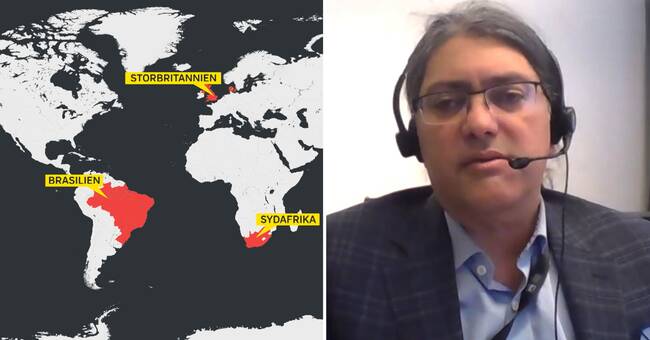What are the new virus variants?
A
British
virus variant is suspected of having debuted in September and has since taken over the spread of infection in the British Isles.
Cases have so far been found in more than 50 countries, including Sweden.
A
South African
variant was discovered in October and cases of infection have so far been detected in more than 20 other countries.
A
Brazilian
variant probably emerged as early as July but still has little spread to the rest of the world.
It is currently being mapped by Japanese researchers after a Brazilian family who had been to the Amazon tested positive in Japan.
For coronavirus, like virtually all other types of viruses, recurrent mutations are a natural part of biology and a prerequisite for survival.
Most often, the mutations make the infection milder.
This is purely evolutionary because a virus that makes the infected so ill that they are unable to meet other individuals, or even die, finds it difficult to spread.
What are they characterized by?
All three variants have mutations in their nail protein, the virus' "sticks" that recognize the host's cells, bind to them and enable the virus to enter and multiply.
These are mutations that probably make the variants easier to spread.
Exactly how much easier is still unclear.
Previously, researchers believed that the British variant was 70 percent more contagious than the "original virus".
It has now been adjusted down to between 30 and 50 percent.
The South African and Brazilian variants also carry another mutation (called E484K) that researchers believe can deceive the immune system so that it does not "remember" the virus and how the body can fight it.
These virus variants are therefore probably easier to re-infect individuals who have already had covid-19.
Are the variants more dangerous and does the vaccine work?
The data on mutated viruses certainly raises concerns among many people, but there is currently no data to suggest that they cause more severe infection or disease progression than the "original" SARS CoV.
Today's vaccine has been developed based on the original virus but contains a relatively large variety of different antibodies.
Should any of them lose their function against mutated viruses, researchers are still convinced that the vaccines still protect - at least against serious disease.
But how strong the protection will be is not known.
It is the subject of intensive research and the WHO urges all countries to share their latest research findings on the virus.
In a worst-case scenario - where important antibodies in the vaccine become completely ineffective against mutated viruses - the vaccine can be changed so that they work on the new virus variants.
According to the industry, this could happen as quickly as in a few weeks.
Why are measures needed?
Although the mutated viruses are not considered to be particularly dangerous, great efforts are being made to prevent them from spreading.
At Christmas, for example, several countries introduced entry bans from the UK and Denmark.
The United Kingdom, in turn, has introduced restrictions on entry from South America and Portugal.
The Swedish Public Health Agency urges the regional infection control authorities to be extra vigilant on outbreaks of infection linked to travel abroad.
Positive test results from these should be examined and DNA sequenced to detect any mutations.
So far, however, the laboratory capacity has been too low for this to be fully possible, and the dark figure can be large.
The more spread mutated viruses get, the greater the likelihood of further changes occurring.
If a variant that is truly vaccine-resistant were to be established, there is a risk that all the vaccinations made so far will have to be repeated.

